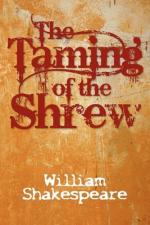|
This section contains 5,595 words (approx. 19 pages at 300 words per page) |

|
SOURCE: “Feminism and Theater in The Taming of the Shrew,” in Shakespeare in Theory: The Postmodern Academy and the Early Modern Theater, The University of Michigan Press, 1997, pp. 51-62.
In the excerpt below, Bretzius surveys the reactions of postwar feminist critics to The Taming of the Shrew.
Whether Kate's final lord-of-creation moral in The Taming of the Shrew is tongue-in-cheek (the so-called revisionist school) or foot-in-mouth (the corresponding antirevisionist school) depends in part on the half-framed, and even half-tamed, nature of her story. For the play that Christopher Sly watches from the vantage of his unfinished Induction, The Taming of the Shrew, already represents a version, a gigantic “suppose,” of the parallel play he acts both out and in, from Petruchio's triumphant “Come, Kate, we’ll to bed” (5.2.184) and Sly's benighted “Madam, undress you, and come now to bed” (Ind.2.117) to the page boy's “My husband and my...
|
This section contains 5,595 words (approx. 19 pages at 300 words per page) |

|


